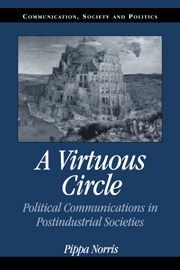Book contents
- Frontmatter
- Contents
- List of Tables
- List of Figures
- Preface
- PART I THE NEWS MEDIA AND CIVIC MALAISE
- PART II TRENDS IN POLITICAL COMMUNICATIONS
- PART III THE IMPACT ON DEMOCRACY
- 9 Negative News, Negative Public?
- 10 Knows Little? Information and Choice
- 11 Cares Less? Cynical Media, Cynical Public?
- 12 Stays Home? Political Mobilization
- 13 American Exceptionalism?
- CONCLUSIONS
- Technical Appendix
- Notes
- Select Bibliography
- Author Index
- Subject Index
10 - Knows Little? Information and Choice
Published online by Cambridge University Press: 26 February 2010
- Frontmatter
- Contents
- List of Tables
- List of Figures
- Preface
- PART I THE NEWS MEDIA AND CIVIC MALAISE
- PART II TRENDS IN POLITICAL COMMUNICATIONS
- PART III THE IMPACT ON DEMOCRACY
- 9 Negative News, Negative Public?
- 10 Knows Little? Information and Choice
- 11 Cares Less? Cynical Media, Cynical Public?
- 12 Stays Home? Political Mobilization
- 13 American Exceptionalism?
- CONCLUSIONS
- Technical Appendix
- Notes
- Select Bibliography
- Author Index
- Subject Index
Summary
To assess what the public learns from the news media, we need to establish suitable benchmarks for political knowledge. Three perspectives are common in the literature. The ‘civics’ approach assumes a single narrow type of ‘ideal’ information about government and public policy that all citizens need to know. The ‘relativist’ stance acknowledges that people have a limited reservoir of political information but suggests that this is sufficient for people to cast a meaningful ballot. A preferable strategy would be to understand what practical knowledge citizens need in order to make informed judgments about the consequences of their actions in multiple roles, for example, as claimants of welfare benefits, as consumers of genetically modified food, or as activists concerned about global warming, in addition to their role as electors. Some judgments involve daunting information hurdles; for others the demands are fairly minimal. Some arise sporadically, like voting, and others involve people's daily lives.
On the basis of this conceptualization we can explore the roles of newspapers, radio, and television in contributing to the practical knowledge that European citizens acquire, using five different contexts that are progressively more abstract: public awareness of social issues such as the personal health risk from skin cancer; economic issues such as the single European currency (the euro); citizens’ rights within the European Union; general knowledge about the institutions and functions of the European Union; and understanding of party policies in elections to the European Parliament. When asked where they looked for information about the European Union, people most commonly cited television (60%), newspapers (41%), and radio (24%).
- Type
- Chapter
- Information
- A Virtuous CirclePolitical Communications in Postindustrial Societies, pp. 208 - 232Publisher: Cambridge University PressPrint publication year: 2000



